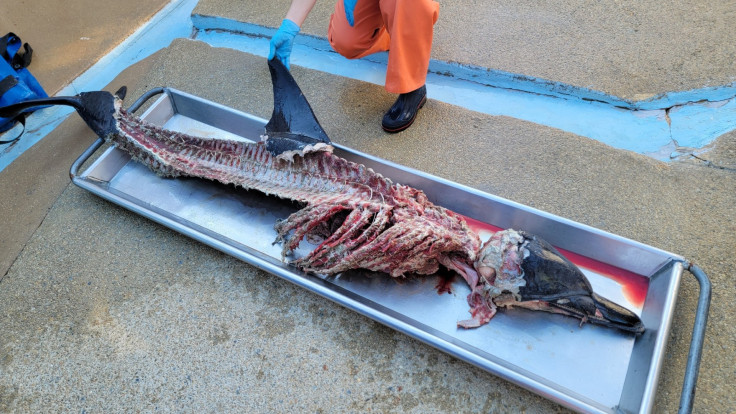Butchered Dolphin Found On New Jersey Beach: 'Very Disturbing'
The suspect took all of its organs and left behind the heart, lungs

The Marine Mammal Stranding Center (MMSC) needs the public's help in finding the culprit behind a "butchered" dolphin that appeared on the beach last Wednesday.
According to the stranding coordinator that works at the MMSC, an unidentified individual called the facility and reported the partial remains of a Common dolphin that was found on the beach at Allen Avenue in Allenhurst, New Jersey.
The dolphin's flesh and some organs had been completely removed by "clean cuts from a sharp instrument" said a spokesperson. The only remaining parts of the mammal were the head, dorsal fin, spine and flukes and two organs–i.e., the lungs and heart.
The remains were later photographed and the carcass buried on the beach by MMSC authorities.
On October 29, witnesses informed the MMSC that a live Common dolphin was struggling in the surf, a block away from where the carcass was found. However, this dolphin was able to swim back out to the ocean.
"It is unknown if this was the same animal," the MMSC said.
Dolphins are renowned for their human-like qualities: They have the ability to 'talk' among each other like humans and live in culturally rich societies. They have long social memories, spanning 20 years, and they look forward to interacting and playing.
The act is a crime under the Marine Mammal Protection Act of 1972, which makes it illegal for a person to take any marine mammal species and/or "hunt, harass, capture, or kill."
This crime is under investigation by the National Oceanic and Atmospheric Administration Fisheries Office of Law Enforcement.
The MMSC is the only federally authorized rescue, rehabilitation, and release facility for marine mammals that has a team of authorized first responders.
If anyone has information regarding this crime, they are urged to call the MMSC's 24-hour hotline at (609) 266-0538.
© Copyright IBTimes 2024. All rights reserved.





















